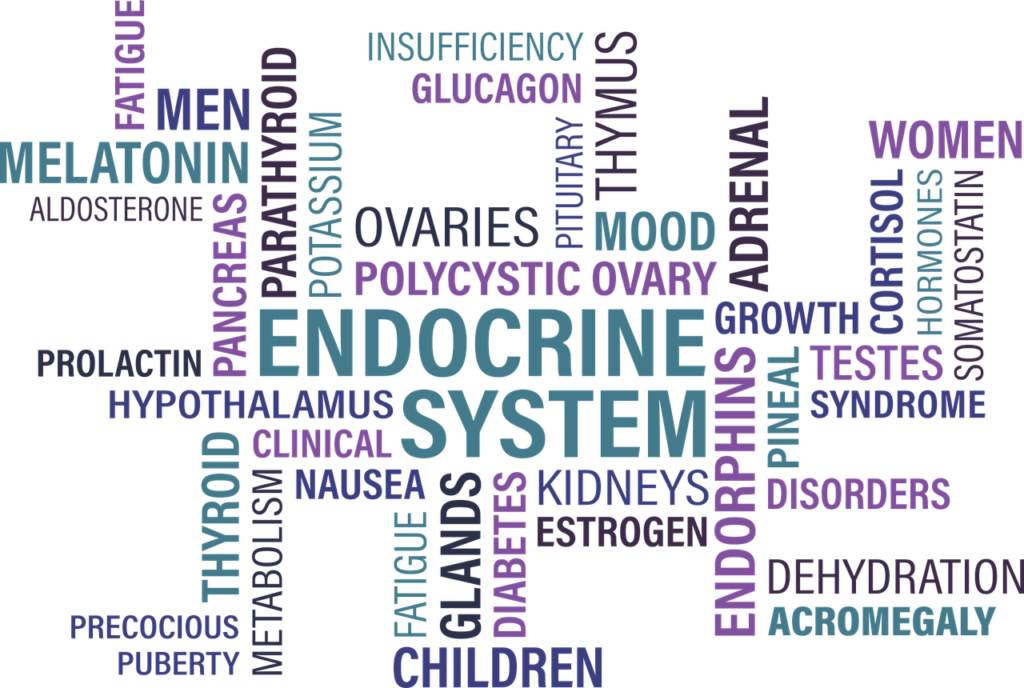The human body has two adrenal glands, one above each kidney. Adrenal glands normally produce 3 different classes of steroid hormones:
- • Glucocorticoids: primarily cortisol which helps the body deal with stress and regulates glucose, protein, and fat metabolism. Cortisol also helps control inflammation, maintain normal blood pressure and keep the immune system in check.
- • Mineralocorticoids: primarily aldosterone which helps regulate blood pressure and body sodium and potassium levels.
- • Androgens: DHEA affects secondary sex characteristics such as underarm and pubic hair in women and may play a role in female libido. DHEA is weaker compared to testosterone, which is the androgen produced by male testes and to a smaller extent by female ovaries.
Normal adrenal gland hormone production depends on hormonal signals from the pituitary gland, which in turn depends on hormonal signals from the hypothalamus. The pituitary and hypothalamus are glands in the brain.
Adrenal insufficiency is an uncommon condition in which the adrenal gland cannot make an adequate amount of these hormones. There are 2 kinds of adrenal insufficiency:
Primary adrenal insufficiency (Addison’s disease):
- • The adrenal gland itself does not work and is damaged or removed by surgery.
- • The most common cause is an autoimmune process in which the immune system mistakenly attacks and damages the adrenal gland.
- • Other causes include surgical removal of adrenal glands, hemorrhage into the adrenal gland, certain genetic defects of enzymes our bodies need to make cortisol, and infection of the adrenal gland such as tuberculosis.
- • In most cases all three hormone-producing cells in the adrenal are affected resulting in decreased production of these three groups of hormones.
Secondary adrenal insufficiency:
- • The adrenal gland is normal but does not function properly because the pituitary gland does not send the hormonal signals needed to direct the production of specific adrenal hormones.
- • Common causes include Pituitary or hypothalamic tumors, damage from surgery, or radiation therapy to the pituitary gland or nearby brain tissue. In many of these patients, other pituitary hormones are also affected.
- • If a patient is treated with cortisol or steroid hormones such as prednisone for >3-6 weeks, the body may reduce its cortisol production (by reducing the signals from the pituitary gland that normally tell the adrenal glands to make cortisol). This signal is a hormone called ACTH and the process is called negative feedback suppression of the pituitary gland. If the dose of prednisone or the exogenous steroid is high enough or the duration of this treatment is long enough, this suppression may continue for a while even after the medicine is stopped. During this period, the cortisol produced by the body may remain low. This cause of secondary adrenal insufficiency can be avoided by tapering off prednisone gradually instead of abruptly stopping it.
Symptoms:
Common symptoms or signs of adrenal insufficiency may include:
- • fatigue
- • generalized weakness
- • loss of appetite
- • nausea
- • weight loss
- • darkening of the skin (in Addison syndrome)
- • dizziness
- • muscle and joint pain
- • salt cravings
- • Low blood pressure
- • Increased heart rate
- • Low blood sodium level
- • High blood potassium level (only in primary adrenal insufficiency.
If adrenal insufficiency is related to pituitary disease, symptoms related to pituitary problems such as headache and visual field loss are present. Other symptoms of low pituitary hormone levels include fatigue, hoarseness, constipation, delay in growth and puberty, impotence, and infertility.
Adrenal fatigue is not a true medical condition, and a normal adrenal gland is not affected by the amount of stress a person is facing.
Diagnosis:
Based on symptoms and other laboratory abnormalities, further testing is needed to establish the diagnosis of adrenal insufficiency.
If adrenal insufficiency is suspected, a morning blood cortisol is obtained. This test must be done between 7 am – 9 am. If the blood cortisol level is low or borderline, an additional test called the “Cortrosyn Stimulation Test” is ordered.
| CORTOSYN (Cosyntropin) Stimulation Test |
1. Draw blood for baseline cortisol level. This should be drawn in the morning (8 to 9 am). 2. Give the patient an intramuscular injection of Cortrosyn (A synthetic equivalent of the pituitary hormone ACTH). This should stimulate the adrenal gland to produce more cortisol (mimics stress response) 3. Draw a second sample of blood exactly 1 hour after the injection for blood cortisol level. Normal: Cortisol > 18 ug/dL (after the Cortrosyn) |
Once the diagnosis of adrenal insufficiency is made, the ACTH level is ordered. This level will be high in Addison’s disease but low in secondary adrenal insufficiency. If the problem is at the adrenal gland level, a CT scan of the abdomen is needed. If the problem appears to be from the pituitary gland, an MRI of the pituitary gland is ordered.
Treatment:
The treatment usually requires lifelong replacement. These hormones are necessary for the sustenance of life and therefore must be taken regularly.
In primary adrenal insufficiency/ Addison’s disease, the patient has to take glucocorticoids and mineralocorticoids, and sometimes adrenal androgen as well. Common glucocorticoids include hydrocortisone, prednisone, or dexamethasone. Hydrocortisone is typically taken 2 or 3 times a day with the first dose in the morning and a second dose in the early afternoon. Prednisone and dexamethasone are given once a day. Patients with primary adrenal insufficiency (but not secondary adrenal insufficiency) also have to take mineralocorticoids (the main one is fludrocortisone). This is usually taken once a day and may need to be increased when the weather is hot and the patient is expected to be outside.
Stress dose:
Because these are stress hormones, higher doses especially glucocorticoids (such as cortisol) are needed during illness, surgery, or trauma. If enough hormones are not given, there is a risk of a dangerous condition called adrenal crisis. Adrenal crisis may lead to very low blood pressure, shock or death. To avoid this, doctors give specific instructions on what to do if a patient is sick (flu, diarrhea, heart attack, or trauma)
Patients should wear a medical alert bracelet or necklace indicating that they have adrenal insufficiency (in case the patient is unconscious and cannot provide the history).
If a patient has a cold or the flu, the cortisol dose may need to be doubled or tripled for three days. If symptoms get worse, especially if they have persistent nausea or vomiting, they should call their doctor or go to the emergency room.
In some cases, a doctor may give patients an emergency kit for intramuscular self-injection of a glucocorticoid called dexamethasone. Clear guidelines are given on when to take it and when to bypass it and go to the emergency room. In the ER, intravenous fluids as well as an intravenous dose of hydrocortisone are given to prevent the condition from deteriorating. When things have stabilized, it is important to return to the normal dose of glucocorticoid (cortisol). Long-term excessive use of these hormones can lead to fluid retention, obesity, osteoporosis, and frequent infections.
Additional information:
Post Disclaimer
We are not your healthcare provider, and your use of this website does not establish a patient-client relationship. All the information contained on this website is for informational purposes only. No material on this site is intended to be a substitute for professional medical advice (diagnosis, treatment, testing or nutritional information). Always seek the advice of your physician or qualified healthcare provider with any questions you may have regarding medical or health-related conditions or treatment. Your healthcare provider knows your condition or situation well and can give you specific advice which would be appropriate for your condition/situation. Your healthcare provider can also guide you more accurately about injection techniques, dietary interventions and the use of medical technology that is most pertinent and suitable for you. Please do not disregard professional medical advice or delay in seeking it because of something you may have read on this website.

